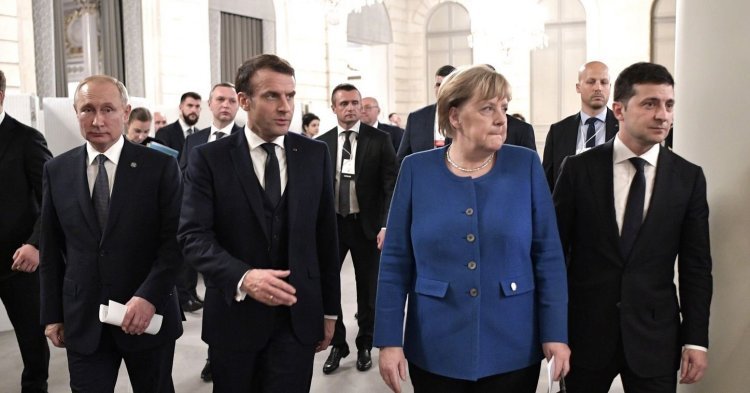Each year, Munich, the bustling Bavarian capital, is the world centre for defence and geostrategic issues. The main topic of this years of the 56th edition of the security forum - founded in 1963 founded by a former German resistant and protagonist of the failed “20th July plot” to assassinate Adolf Hitler - was the “decline of the West” or “Westernessless.” This issue echoes with Europe and Northern America’s concerns for the political and military affirmation of great ‘Eastern’ powers such as Russia and especially China.
This feeling of “decline” was particularly visible during the 2010’s, with the war in East Ukraine between the Kiev’s government and Donetsk and Lugansk’s pro-Russian separatist forces. Reinforcing this “decline” was Trump’s election, his “America First” motto ringing true with his dispute on multilateralism on a worldwide scale.
Divisions in the West
According to a great number of observers, this first fracture line between the US and the EU - deeply attached to UN style multilateralism - is an opportunity to free the EU from Washington military supervision and to move towards a more integrated Union in the defence sector. European countries, however, are divided on this subject. This lack of unity is made clear by the current difficult relationship between France and Germany.
Although less true since the EU’s enlargement out to Eastern Europe, the Franco-German tandem is the historical driving force of European integration. The big European developments, such as the Single Market or the Euro, have been accomplished thanks to the blessing of the French president and the German Chancellor. Since the ‘mythical’ founding Franco-German partnership between Helmut Kohl and François Mitterrand, the respective two leaders have found it hard to get along, and practicality has seemed to have overtaken the idealistic desire of building a European social project.
Throughout his election in 2017, Emmanuel Macron wanted to reinvigorate this strategic tandem with Berlin. Angela Merkel and her government were reassured by his triumph, being a candidate that had asserted himself as deeply pro-European against an openly Eurosceptic one. With this said, the German government expected the new French executive to make some new efforts with regards to financial discipline: if deficit fell below 3% of national GPD in 2017, debt would have been higher than 98%, far from 60% Maastricht debt requirement.
Emmanuel Macron for his part had attempted to face Berlin with a done deal, giving grandiose speeches and urging the EU to make reforms and reinforce the sovereignty of its defence and security. These requests were ignored by the German government, which is currently dealing with unusual domestic instability.
Paris, impatient, and Berlin, silent
Emmanuel Macron has been the first French president to speak at the Munich forum since Nicolas Sarkozy in 2009. In other words, the young French president was eagerly awaited, especially in view of his sensationalist comments in the last few months regarding NATO, which according to Macron is now “brain dead”, as well as a reinforced dialogue with Russia, hostile to European liberal democracies.
The French president took advantage of this forum in Munich to express his dissatisfaction with his great ally: “I’m not frustrated, I‘m impatient.” Using diplomatic language Macron urged: “Get a move on then, my German friends!” He expects “clear answers” from Berlin, particularly when it comes to communal defence and security issues.
The German defence minister Annegret Kramp-Karrenbauer, however, refused to give answers, despite her weakened position following the Thuringia regional government formation fiasco. Angela Merkel’s close colleague flatly rebuffed the situation, stating that “we will be protected by NATO thanks to the American nuclear umbrella.” Her response was to both Macron’s criticisms of the organization and to the French proposal (which was actually suggested by a German conservative MP) of pooling the French nuclear arsenal into European nuclear resources in order to promote a common and independent strategic culture.
The first three years of Macron’s mandate have been marked by a standoff between Paris and Berlin. Germany seems to be using the lack of dynamism in the French economy as an excuse to avoid participating in this geopolitical issue. To repeat Jean Quatremer’s scathing words in the French daily newspaper Liberation, “This aging and conservative Germany believes that the EU in its current form, that is, a big Switzerland, suits them well. The single market allows them to build up a surplus […] and French dreams of a European power are completely foreign to them. The American military umbrella, even a broken version, is more than enough for them.”
Despite their diametrically opposing views, some discussions aiming to reconcile France and Germany were held. In an informal dialogue, Emmanuel Macron said that “[Europeans] very clearly need NATO” and that Russia was already “interfering” and “attacking”.
The hand extended towards Germany was only partially accepted by the Minister for Foreign Affairs, who claimed he was “open” to starting a dialogue about deterrence. In a column in Opinion, the academic Frédéric Charillon summarised the situation, explaining that: “Even though the theme of the conference (” Westlessness ") would have been the perfect opportunity for the French president to drive his point home, he preferred to focus on closing the EU’s ranks.” However, there is an overwhelming feeling of disappointment in the air, and the 2020 conference seems to show European divisions more than ever before.
The post-Merkel era
The question is, will the French government patiently wait for the 2021 legislative elections? Many observers believe it will. “Macron is preparing for the post-Merkel period,” said the German daily newspaper Tagesspiegel, shortly after the end of the Munich conference. Emmanuel Macron was not the only leader who criticised the German Chancellor for her country’s lack of involvement in international affairs. Many leaders think that Germany is settling as an economically powerful country and is not taking international responsibility.
Angela Merkel appears to be very weak, both internationally and in her own country. In December, the Social Democratic Party (SPD) a partner in the government coalition, chose a duo of presidents who were very left-wing and quite sceptical about the party’s participation in this coalition. In early February, Annegret Kramp-Karrenbauer resigned from her post as secretary-general of the Christian Democratic Union (CDU) following the disastrous management of the electoral crisis in Thuringia. If Kramp-Karrenbauer remains in government, this defection is yet another blow for Merkel, who relied upon this faithful ally to help her peacefully finish her term.
War over Merkel’s succession has thus been reinvigorated, and it will be fierce. On one side is Friedrich Merz, who will assumedly be taking a neoliberal stance but has also already displayed his pro-European side in a forum endorsed by Sigmar Gabriel. On the other is Armin Laschet, Minister-President of North Rhine-Westphalia and Plenipotentiary of the Federal Republic of Germany, who is in charge of Franco-German cultural relations. He is more consensual, however, has distanced himself from the Chancellor when it comes to which attitude to adopt in the face of repeated calls from France. “I would have liked a more determined, faster response” to President Macron’s latest proposals, he said.
An alternative could also come from the Green Party (die Grünen-Bündnis 90), the current main left-wing force and the second party in the polls across the Rhine. The French President seems to be fully aware of this, partaking in lengthy discussions with the duo of presidents Robert Habeck and Annalena Baerbock over dinner in Munich. It remains to be seen here too whether Macron’s voluntarism can find a more sympathetic ear, in a country traditionally reluctant to undertake any geostrategic commitments.
Likewise, even if France and Germany did manage to see eye to eye, it would not necessarily mean that the other European partners would follow them in their quest for enhanced European sovereignty. Internal disputes between members of the Union probably still have a long future ahead of them.



Follow the comments: |
|
